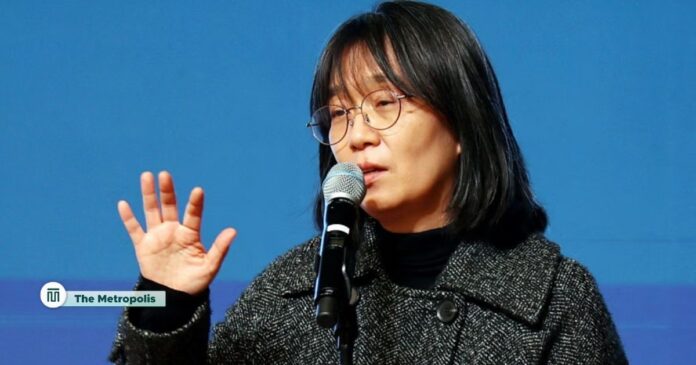Since the award was announced, local bookshops reported that more than a million copies of books written by Han Kang, the first South Korean to win the Nobel Prize for Literature, have been sold.
The novel and short story writer’s first English-language translation, “The Vegetarian,” which won the Man Booker Prize, is what made her most famous abroad.
Last week, the Swedish Academy announced that the 53-year-old, who also became the first Asian woman author to win the Nobel Prize, was selected “for her intense poetic prose that confronts historical traumas and exposes the fragility of human life.”
The announcement of Han’s victory caused a stir in South Korea, with tens of thousands of people rushing to order her books, causing the websites of major publishing houses and bookshops to crash.
Three significant bookshops and online retailers, Kyobo, Aladin, and YES24, told AFP that since last Thursday’s Nobel announcement, at least 1.06 million copies, including e-books, had been sold as of Wednesday morning.
The sales of Han Kang’s books are at an all-time high. We have never seen anything like this,” Kyobo spokesperson Kim Hyun-jung told AFP.
Han’s victory, according to online retailer Aladin, has significantly increased sales of South Korean literature overall in addition to resulting in a startling 1,200-fold increase in sales of her books when compared to the same period last year.
Due to the statement, “the overall sales of Korean literature increased by more than 12 times compared to the previous year” since her victory.
Two books were sold. The books “Inventory of Losses” by Judith Schalansky and “Atlas de botanique élémentaire” by Jean-Jacques Rousseau, which Han recently mentioned she was reading, had also become popular, according to Aladin.
Although it lacks precise statistics, the Kyobo Book Centre reported that Han’s books had significantly higher sales than those of other Nobel laureates.
“We have been in the publishing industry for a while, but this whole situation feels very surreal even to some of us,” a Kyobo worker told AFP.
South Koreans are ecstatic about the news, and Yonsei University in Seoul, Han’s alma mater, has displayed banners that read, “Congratulations to the proud Yonsei alumnus, Han Kang, on winning the Nobel Prize in Literature.”
A congratulatory banner was hung on a building in her hometown of Gwangju, where a massacre in 1980 served as the inspiration for Han’s successful book “Human Acts.” At the time, a military helicopter fired on the building.
To meet the demand for Han’s books, some printing houses reportedly ran at full capacity over the weekend, according to local reports.
One Aladin employee told AFP, “Since I started working for the company in 2006, I’ve never been this busy.”
“But it’s all been very happy.”



